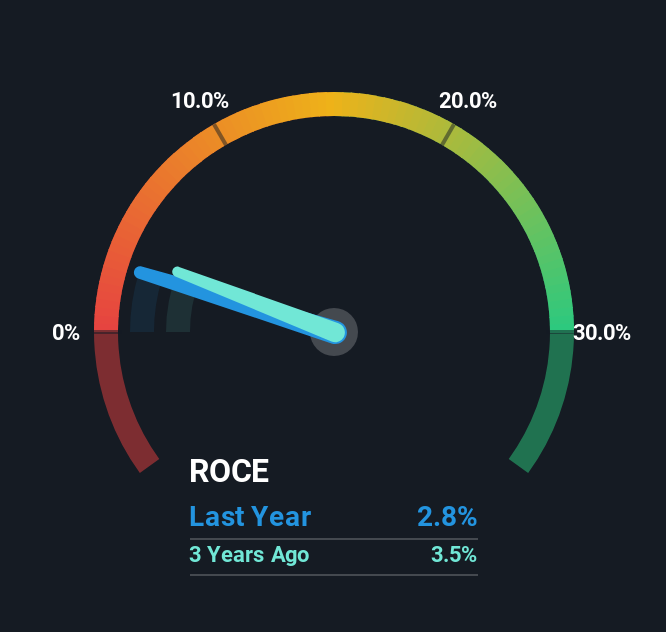Ignoring the stock price of a company, what are the underlying trends that tell us a business is past the growth phase? More often than not, we'll see a declining return on capital employed (ROCE) and a declining amount of capital employed. Basically the company is earning less on its investments and it is also reducing its total assets. So after we looked into Lechwerke (FRA:LEC), the trends above didn't look too great.
Return On Capital Employed (ROCE): What Is It?
For those that aren't sure what ROCE is, it measures the amount of pre-tax profits a company can generate from the capital employed in its business. Analysts use this formula to calculate it for Lechwerke:
Return on Capital Employed = Earnings Before Interest and Tax (EBIT) ÷ (Total Assets - Current Liabilities)
0.028 = €19m ÷ (€1.7b - €1.1b) (Based on the trailing twelve months to December 2024).
So, Lechwerke has an ROCE of 2.8%. Ultimately, that's a low return and it under-performs the Electric Utilities industry average of 6.9%.
View our latest analysis for Lechwerke

Historical performance is a great place to start when researching a stock so above you can see the gauge for Lechwerke's ROCE against it's prior returns. If you'd like to look at how Lechwerke has performed in the past in other metrics, you can view this free graph of Lechwerke's past earnings, revenue and cash flow.
What Can We Tell From Lechwerke's ROCE Trend?
In terms of Lechwerke's historical ROCE trend, it isn't fantastic. Unfortunately, returns have declined substantially over the last five years to the 2.8% we see today. What's equally concerning is that the amount of capital deployed in the business has shrunk by 57% over that same period. The fact that both are shrinking is an indication that the business is going through some tough times. If these underlying trends continue, we wouldn't be too optimistic going forward.
While on the subject, we noticed that the ratio of current liabilities to total assets has risen to 61%, which has impacted the ROCE. Without this increase, it's likely that ROCE would be even lower than 2.8%. And with current liabilities at these levels, suppliers or short-term creditors are effectively funding a large part of the business, which can introduce some risks.
What We Can Learn From Lechwerke's ROCE
In short, lower returns and decreasing amounts capital employed in the business doesn't fill us with confidence. Long term shareholders who've owned the stock over the last five years have experienced a 18% depreciation in their investment, so it appears the market might not like these trends either. That being the case, unless the underlying trends revert to a more positive trajectory, we'd consider looking elsewhere.
On a final note, we've found 1 warning sign for Lechwerke that we think you should be aware of.
If you want to search for solid companies with great earnings, check out this free list of companies with good balance sheets and impressive returns on equity.
New: AI Stock Screener & Alerts
Our new AI Stock Screener scans the market every day to uncover opportunities.
• Dividend Powerhouses (3%+ Yield)
• Undervalued Small Caps with Insider Buying
• High growth Tech and AI Companies
Or build your own from over 50 metrics.
Have feedback on this article? Concerned about the content? Get in touch with us directly. Alternatively, email editorial-team (at) simplywallst.com.
This article by Simply Wall St is general in nature. We provide commentary based on historical data and analyst forecasts only using an unbiased methodology and our articles are not intended to be financial advice. It does not constitute a recommendation to buy or sell any stock, and does not take account of your objectives, or your financial situation. We aim to bring you long-term focused analysis driven by fundamental data. Note that our analysis may not factor in the latest price-sensitive company announcements or qualitative material. Simply Wall St has no position in any stocks mentioned.
About DB:LEC
Established dividend payer with adequate balance sheet.
Market Insights
Community Narratives



